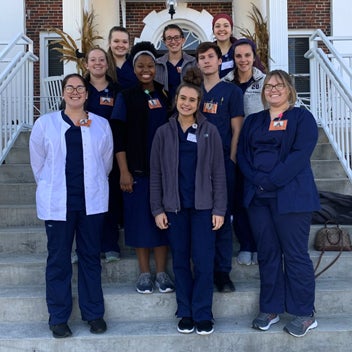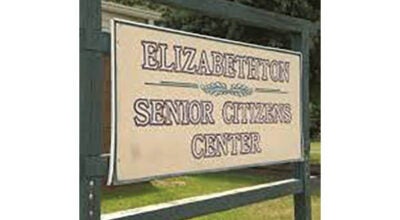The next generation of nurses… EHS Nursing Education puts high school students into the CNA nursing field
Published 3:53 pm Friday, May 8, 2020
1 of 1
|
Getting your Trinity Audio player ready...
|
BY IVAN SANDERS
STAR STAFF
If there is one thing that the COVID-19 pandemic has shown, it is the importance of nurses and doctors on the frontline to help those who have become sickened due to the virus.
But could one imagine being a high school student who has completed the necessary studies to become a CNA (Certified Nursing Assistant) and immediately be put to work in a long-term care facility with the directive of keeping those who are most vulnerable safe from the virus while providing the necessary care they need?
For Elizabethton High School students Macey Burleson, Makayla Coad, Caleb Fair, Taylor Greene, and Hannah Williams that is exactly the position they found themselves in after completing the necessary courses needed to achieve their CNA certification.
They are five of the 10 students from Elizabethton who completed the course and are now working as CNA’s in long-term care facilities.
“At EHS, students can take the class Nursing Education,” said Katie Dugger who is the course instructor at Elizabethton High School. “It is a 4th level class for juniors and seniors who have completed other classes in the Health Science pathway of study, which is one of our many Career & Technical Education pathways, designed for students interested in pursuing careers in health care.
“While it does take a higher level of dedication, students do have time during their school day devoted to Nursing Education as they would any other class.”
To achieve CNA certification is no small accomplishment as it takes several hours of instruction that must be completed along with their normal studies.
Not only does the learning come from books and in-class education but the students also must complete hands-on instruction as well.
“In order to become a CNA, students must complete a 100-hour course that has been approved by the TN Department of Health,” according to Dugger. “Students must complete a minimum of 60 classroom hours and 40 clinical hours for 100 total hours prior to being eligible to take their state certification exam.
“Our classroom hours are completed at the school and our clinical hours take place at Ivy Hall Nursing Home. Ivy Hall has been a wonderful clinical placement facility for us and welcomed our students with open arms.
“While there, students work directly with Ivy Hall CNAs and provide direct patient care under the appropriate supervision,” Dugger continued. “The certification process is a two-part exam and consists of a 75-question written exam and a skills exam during which candidates must perform five out of the 27 CNA skills they learn.
“These skills are chosen at random and prior to testing, the students do not know which skills they must perform for the test observer. In order to pass and become a certified nursing assistant, candidates must score at least a 75% competency on the written test and must pass all five of their hands-on skills.”
Dugger hasn’t been surprised that her five CNA students have handled all the issues around the pandemic with flying colors and are applying their skills to do their best for their patients.
“As for everyone in health care, this time has been challenging for these students as new CNAs being certified in December of 2019 as they settle into new jobs plus the added stress of the changes that have occurred in response to COVID-19,” Dugger said.
“They have been tested for COVID-19 within their work facilities as a precaution, have their temperatures taken upon arrival to work, and must wear masks continuously while at work, which is typically for 8 hours. Though challenging, they are handling things well and have remained committed to providing quality care to their residents.”
The Nursing Education program began in 2018 at EHS and have seen 15 students complete the course from its inception. The class is taught by Dugger one time a year and has seen tremendous growth.
It’s not the first time the program has been offered at the school as it was restarted by Dugger in 2018 after not being offered for at least 10 years at the school.
Dugger saw one student graduate in Spring 2018, four students in Fall 2018, and that number grew to 10 in the fall of 2019.
The instructor has been tremendously pleased with seeing her students stay committed to the program and now working on the front lines.
“Proud is an understatement!” said Dugger. “These students go above and beyond by completing this class and all the steps necessary to become CNAs.
“They work hard in the classroom as well as at our clinical facility. There are days we go to Ivy Hall at 6 am and stay until 2 pm.
“It is such a rewarding experience as their teacher to see them grow from nervous, inexperienced students the first day of clinicals with patients/residents to confident, experienced young adults within a matter of weeks,” continued Dugger.
“What they learn and experience through this program is, for me, the highlight of teaching. They get to take what they have learned in a textbook & classroom into a facility where they are able to provide direct care to living, breathing people in need of care!
“The growth and maturation I get to witness in each student are remarkable and to know that some of them are on the front lines today makes me feel like a proud parent!”
Even though they achieved their CNA certification, some of these students will continue their education in the medical field according to Dugger.
“The majority of the students who enroll in Nursing Education at EHS have plans to go on and pursue higher postsecondary opportunities, such as becoming LPNs or RNs,” stated Dugger. “Even if they choose a path outside of nursing, this experience is valuable in providing industry experience.
“They will be a step (or more) ahead of others in college who may have not have had any real-world experience.”
With the opportunity to work in the field at such an early age, the student gets a taste of what the expectations and emotions of working in health care are all about.
It is for that reason that Dugger works diligently to make sure that the students truly are prepared for what lies ahead and hoping to help provide a picture of what opportunities could lie ahead down the road.
“I feel like the program is set up to provide these students with an accurate picture of what health care is like,” Dugger commented. “The greatest opportunity a student can have is to get out into a real facility with real patients or residents and become immersed.
“This opportunity really shows the students if nursing is the right career path for them before they graduate high school, making their postsecondary education & career path more clear.
“My goal as their teacher is to open their eyes to every opportunity available to them and assist in guiding them to the right fit for them.”






